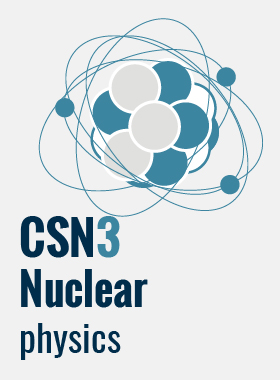Nuclear physics
 CSN3 coordinates research into the structure and dynamics of nuclear matter. Italian nuclear physicists are contributing to the development of experimental techniques to study nuclei under extreme conditions. Experiments using particle accelerators enable scientists to study the mechanisms that control the development of stars in each stage of their life and to create in the laboratory the extreme conditions of density and temperature that resulted in a quark-gluon plasma, the state of the matter that probably existed in the universe for the first ten millionths of a second in the aftermath of the Big Bang. According to the fundamental theory of strong interaction (quantum chromodynamics), in this primordial phase the elementary particles of matter are distinct from one another, the nucleus of the atom does not exist and there are no protons or neutrons. The Committee is also concerned with the development of new applications, for instance, in the field of oncological hadron therapy.
CSN3 coordinates research into the structure and dynamics of nuclear matter. Italian nuclear physicists are contributing to the development of experimental techniques to study nuclei under extreme conditions. Experiments using particle accelerators enable scientists to study the mechanisms that control the development of stars in each stage of their life and to create in the laboratory the extreme conditions of density and temperature that resulted in a quark-gluon plasma, the state of the matter that probably existed in the universe for the first ten millionths of a second in the aftermath of the Big Bang. According to the fundamental theory of strong interaction (quantum chromodynamics), in this primordial phase the elementary particles of matter are distinct from one another, the nucleus of the atom does not exist and there are no protons or neutrons. The Committee is also concerned with the development of new applications, for instance, in the field of oncological hadron therapy.



